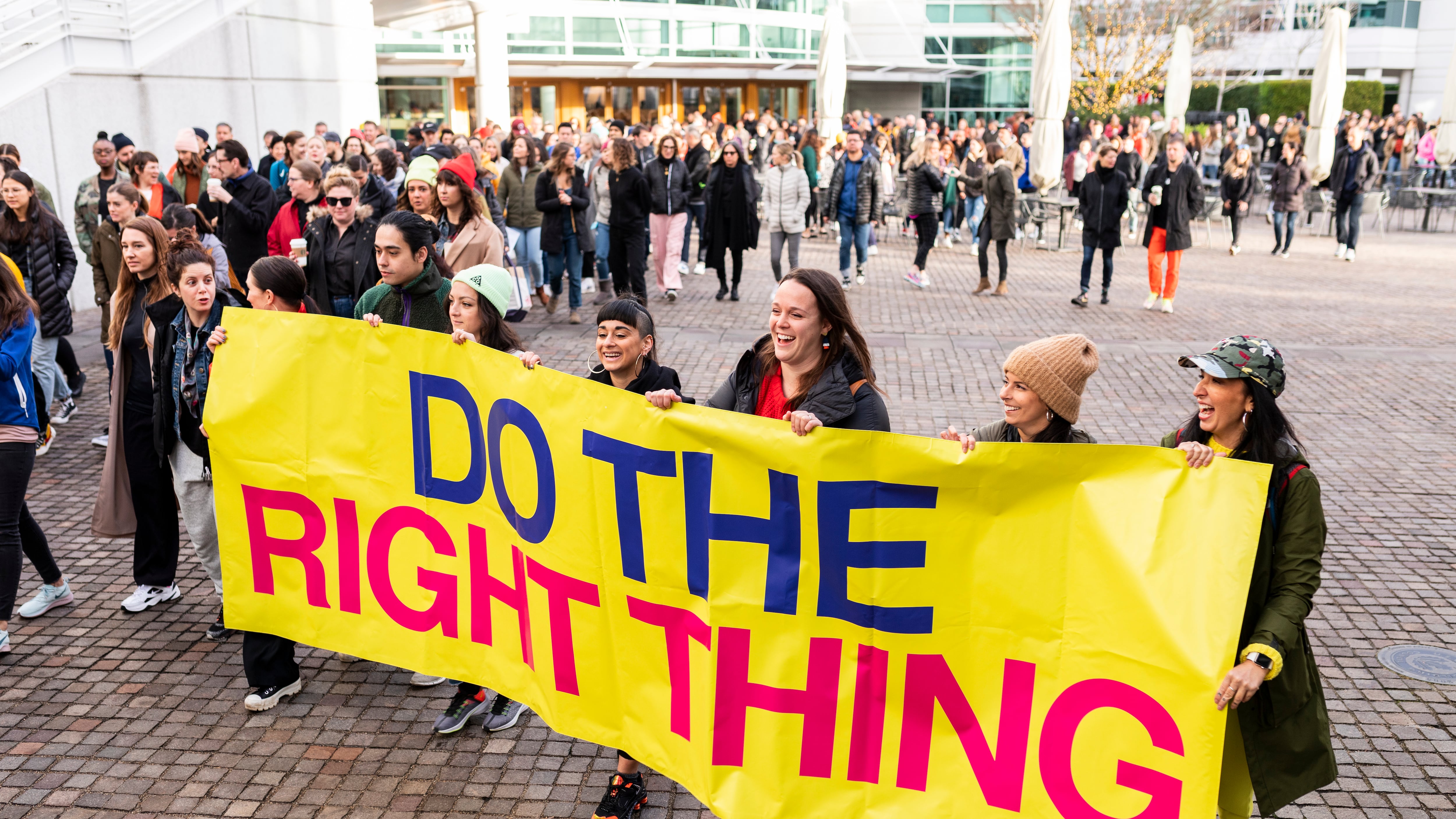As Nike prepared to reopen a renovated building named after embattled track coach Alberto Salazar, at least 400 employees this morning staged a protest of the company's treatment of women.
The picket was quiet and orderly. But it marks a watershed moment at Oregon's flagship company, where internal dissent is nearly unheard of.
The inciting incident? The reopening of the Alberto Salazar Building, an office on Nike's Beaverton campus named after the Nike Oregon Project running coach. This fall, several athletes—including Mary Cain and Amy Yoder Begley—accused Salazar of berating, humiliating and body-shaming them.
In early October, after years of investigation into Salazar's coaching practices, the U.S Anti-Doping Agency banned Salazar from coaching for four years after finding he had encouraged his athletes to use performance-enhancing drugs. (Salazar and Nike contest those findings.)
Yet Nike has pressed forward with renovations on the office named after Salazar. The interior of the newly renovated building, as described by two Nike employees, is plastered with images of Salazar. It wasn't rebranded during the renovation, the two employees who spoke with WW said.
That decision led to an unprecedented sight in Beaverton this morning: Some 400 employees marching around Lake Nike, carrying signs and chanting, albeit briefly. One sign read, "just do better." Another read, "Nike is a woman."

While the company didn't interrupt the protest, its loyalists told employees not to speak to the press.
A woman in a camouflage beanie started handing out two flyers prior to the walk: One read, in part, "No employee is permitted to speak with the news media on an Nike-related matter, on any on- or off-the record, without prior approval from Nike Global Communications."
It warned that any "breach in the communications policy, including unauthorized information that is 'leaked' to the media," could result in being fired.
The other flyer she distributed branded the walk as a "celebration" of women rather than a protest: "Thank you for walking with us to celebrate what women bring to sport and to champion equality," it read.
The flyer said that Nike leadership was "committed to hearing your voice, in person!" It said that leadership is inviting employees to have "face-to-face time" to "share ideas" with upper management.
It was not clear from how high in the company these flyers originated. A Nike spokesman tells WW the flyer warning employees not to speak to the press was not an official company document.
"We respect and welcome employees' feedback on matters that are important to them," says spokesman Greg Rossiter. "The flier prepared by some employees was not officially distributed by Nike."
Rossiter confirmed Nike has a media policy, and says it does not conflict with employees' legal rights.
WW approached more than a dozen employees at the protest. All declined to speak. During the march, WW's photographer was escorted off of campus.
WW spoke with only two employees who agreed to speak with media, both on condition of anonymity. They spoke in hushed tones as they walked along, saying they felt oppressed by Nike's executives.
The employees said upper management caught wind of the protest plans on Sunday and tried to "water it down." They said that executives warned protestors not to stop the protest at the Salazar building. (This worked: The march stayed clear of the office reopening.)
"The culture is about rank and file, and about fitting in," one of the employees said. "We're the teammates supporting our team, as soon as you break rank you're out."
The two employees shared that they feel stifled by Nike's culture. They said the flyer handed out warning against speaking with media was a "perfect example" of how the company stifles dissent.

The protest began at 9:15 outside the Mia Hamm Building, at the center of Nike's campus.
The line of employees snaked along the hedges of a soccer field, over a bridge and around the perimeter of the quiet, pristine lake at the center of campus. As the protestors spread out, about three to a messy row, the procession stretched for about a quarter mile.
A group of voices, mostly female, chanted "just do better." The chant died out in less than a minute.
Related: In November, WW asked why Nike employees weren't resisting.
The line reached the Seb Coe building, about a half-mile away from the march's starting point, around 9:40 am.
When they arrived at the building, three speakers spoke briefly about holding the company accountable.
"We need to serve our athletes better," said one male speaker.
Several employees started handing out sticky notes and sharpies. One woman approached a small group and started handing out the sticky notes, encouraging the group to write down messages on the notes that would then be collected and would help inform Nike about concerns.
The woman told the small group that an internal investigation would be launched to look into the concerns. The group of employees scoffed at the mention of an internal investigation.
"Let's all write 'outside investigation' on our sticky notes," one woman in the the group said.
One of the two anonymous employees who spoke with WW on the walk said she loves her work, but knows that Nike disapproves of any dissent—and especially of talking with the press.
"If this is the last day you see me here," she said, "this is why."
